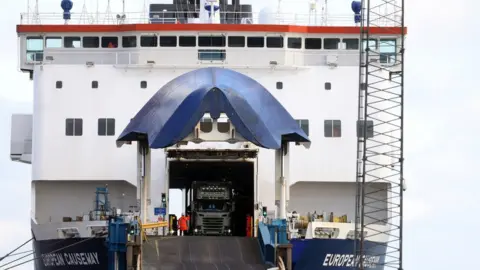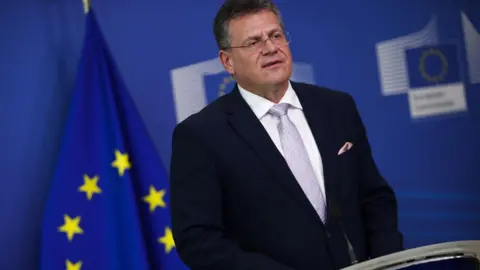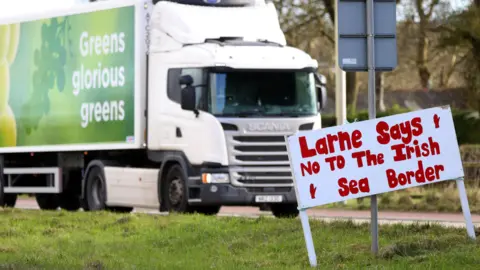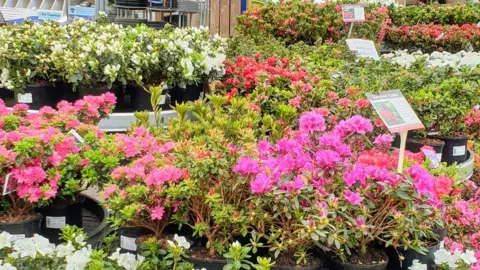Brexit: EU has 'head in sand' over checks at NI ports, says Foster
 PAcemaker
PAcemakerThe first minister has accused the vice president of the European Commission of having his "head in the sand" over Brexit checks at NI sea ports.
The UK wants a two-year extension to the "grace periods" on some checks to give businesses more time to adjust.
But on Wednesday, Maros Sefcovic seemed to rule out changes until the Northern Ireland Protocol is fully implemented.
Arlene Foster claimed Mr Sefcovic is ignoring problems faced by NI importers as a result of new trade barriers.
Speaking to ITV's Robert Peston, Mrs Foster said he appeared to be putting his "head in the sand" and his "fingers in his ears" when the issues were raised.
'Can't get a pot plant'
The DUP leader said the Northern Ireland Protocol was causing problems, not only for businesses who trade across the Irish Sea, but also for consumers who are having difficulties with parcel deliveries from Great Britain.
"You can't even get a pot plant," she told the programme, adding that the protocol has badly disrupted the UK's internal market.
The UK and EU will try to solve issues with the new Irish Sea border later on Thursday when Michael Gove speaks to Maros Sefcovic from the European Commission.
Mrs Foster described the current situation as an "incredible state of affairs".
However, Sinn Féin MP Chris Hazzard said the public will find Mrs Foster's comments "laughable".
"Most observers are seeing a DUP approach to Brexit which at best is wrapped up in a series of contradictions and at worst stinks of hypocrisy," he said.
Taoiseach (Irish PM) Micheál Martin said all sides need to "dial down the rhetoric".


Michael Gove and Maros Sefcovic disagree on many things, but they are on the same page when it comes to retaining the Northern Ireland Protocol.
London believes it needs to be fixed, while Brussels argues the current teething problems will be overcome once it is fully implemented.
In his letter, the EU commission vice president ruled out any changes to the Protocol, but didn't close the door to a possible extension of the current grace periods.
He talked about pragmatic solutions and with the Irish government moving closer to supporting an extension, that may be the obvious outcome from the talks between London and Brussels.
But for how long? A one year extension would land us very close to the 2022 assembly election and the extra political pressure that would bring.

 FRANCISCO SECO / POOL
FRANCISCO SECO / POOLIts aim was to prevent a hard land border on the island of Ireland, but it came at the expense of a new trade border between Northern Ireland and Great Britain.
Northern Ireland remained in the European Union's single market for goods, but the rest of the UK did not - meaning some checks for goods travelling between Great Britain and Northern Ireland were introduced.
UK Cabinet Minister Michael Gove wrote to the European Commission seeking greater flexibility on goods checks at Irish Sea ports, asking for more time to phase in the new rules.
But in a letter to Mr Gove on Wednesday night, Mr Sefcovic complained the UK was not meeting its obligations under the protocol and any flexibility would depend on compliance with the existing deal.
 PAcemaker
PAcemakerMr Hazzard told the BBC's Good Morning Ulster programme that there was "no surprise" in Mr Sefcovic's letter.
"We need to get away from the idea that we're in some kind of catastrophic trading situation - we're not. Most businesses are coping. There are undoubtedly issues to be addressed and everybody's acknowledged that.
He said one of the problems was that GB suppliers were "simply not prepared for the transition", but added: "Nobody is blaming the businesses."
"There was an agreement made between the British government and EU in December to work a number of flexibilities to help limit the disruption... but for example, they have yet to grant the EU access to the British customs IT system. That would help limit some of the friction but that hasn't happened.
"They haven't got the trusted trader scheme up and working operationally yet. You can't put the cart before the horse."
The Ulster Unionist Party (UUP) said Mr Sefcovic's letter "reeks of arrogance and intransigence".
"Instead of protecting the Belfast Agreement and defusing tensions, this letter will do the exact opposite," said UUP leader Steve Aiken.
He claimed Northern Ireland was "being used as a punch bag in the EU`s confrontations with the UK government".
'Too high pitched'
Taoiseach (Irish PM) Micheál Martin said it is important to remember that only weeks have passed since the Brexit deal was agreed and that all sides "need to cool it".
"There were bound to be teething problems and certain people were not as prepared as they should have been in relation to the implications - we witnessed that ourselves in the Republic."
Mr Martin told RTÉ that Brexit "brought challenges to everybody" and that there are issues that the British government "need to sort out", but that some EU member states "need to cool it as well".
Mr Martin said the dispute over Covid vaccine maker AstraZeneca "was unnecessary" and became "too high pitch at member state level".

The owner of a GB gardening company said he has been told by plant health authorities that he cannot export anything to Northern Ireland or the Republic anymore.
Ken Cox of Glendoick Gardens and Nurseries in Perth told the BBC: "The EC regulations have said that we can only grow plants in pure peat and they can't have any contact with the soil or else we can't export them anymore.
"The problem with that idea is we've also been told by the British Government that we're not allowed to use peat in cultural production anymore.
"On the one hand, the government is telling us we're not allowed to use material and the EU is telling us that's the only thing we can grow in, in order to export it to the EU."
